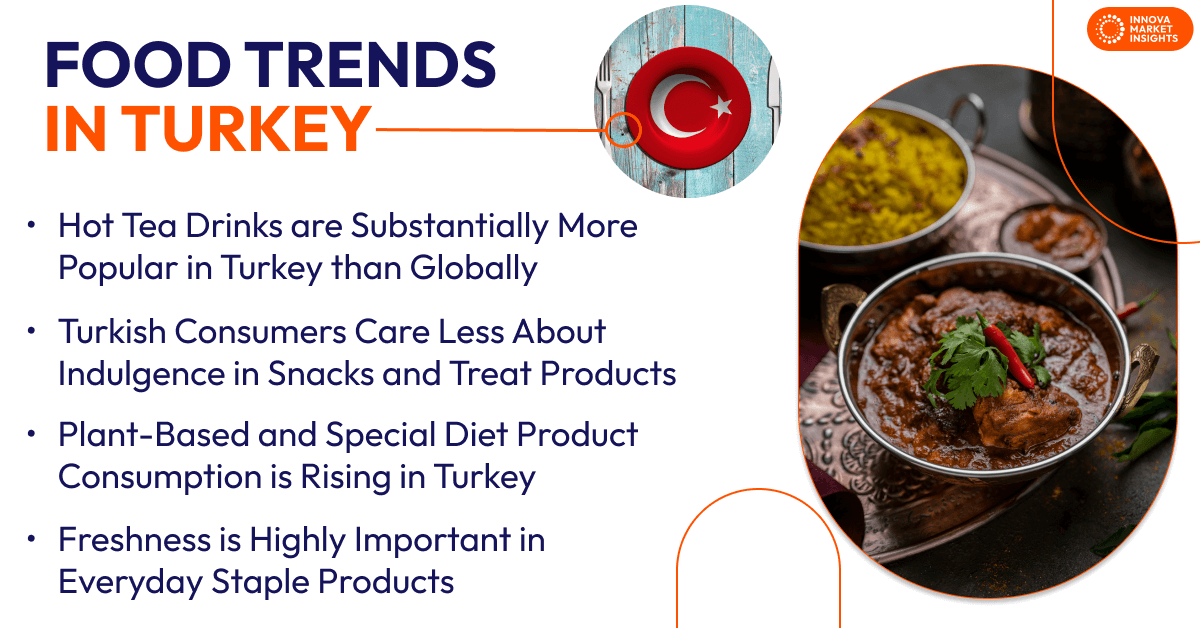July 26, 2024 – Here we provide a comprehensive analysis of the food and beverage landscape in Turkey. Exploring key food trends shaping consumption habits in Turkey, each category of food and beverage will be highlighted. This includes popular claims and attributes driving purchasing decisions, as well as valuable insights for brands to capitalize on evolving preferences. The categories in discussion are the following: beverages, everyday staples, meal preparation, snacks and treats, and plant-based and special diet foods.
Beverage Trends
Turkish consumers are influenced by a variety of factors when it comes to beverage choices, with product safety and natural claims being particularly important. While penetration for alcoholic beverages is lower than the global average, wine, hard alcohol, and cider show higher penetration rates in Turkey. The consumption of non-alcoholic beverages is driven by changing taste preferences, with natural ingredients and product safety being key drivers.
Soft drink consumption is influenced by health and clean label claims, with natural ingredients being a significant factor for consumers. This is especially true in bottled water consumption, where 75% of consumers in Turkey stated that health was their primary driver of increased consumption. Energy drink consumers are looking for products with safety claims, as are iced coffee and tea consumers. Juice and smoothie consumers are looking for organic, and vitamin/mineral fortified claims.
Hot tea is a particularly popular beverage in Turkey, with penetration rates exceeding the global average (84% vs. 55%). Freshness is a key attribute for tea consumers, and local sourcing is also important. The consumption of coffee is also high in Turkey, with a significant portion of consumers increasing their intake due to variety and novelty.

Everyday Staples Food Trends
Food trends in Turkey research shows that consumers under-index the global average for bread purchasing. Health is the top factor for those both increasing and decreasing their intake of bread, and freshness is the top overall attribute of importance. Wholegrain/multigrain and organic choices are popular claims for bread consumers. For breakfast cereal consumers, health and fresh attributes are highly important.
Consumers in Turkey are increasing their intake of dairy products across the board, influencing the region’s food trends. Between 1 in 4 and 1 in 5 consumers are increasing their intake of yogurts, milk drinks, and cheese. Freshness is the most important attribute in all these categories, and those that are increasing their uptake cited health most often.
Healthy image drives increasing consumption of meat and poultry for consumers in Turkey. Freshness is seen as the main attribute influencing purchasing decisions in both categories, cited by three-quarters of consumers for fish and two-thirds for meat.
Meal Preparation Food Trends
Turkish consumers are increasingly seeking convenient meal preparation solutions, with a notable rise in the consumption of bouillons, stocks, seasonings, table sauces, condiments, dips, savory spreads, and sweet spreads. This food trend is driven by factors such as taste, time-saving needs, and changing preferences. While the consumption of ready meals has remained relatively stable, the demand for other convenient meal preparation options is on the rise.
Freshness is a key attribute influencing purchasing decisions across all meal preparation categories, with two-thirds of consumers citing it as a primary factor. Organic, halal/kosher, and local ingredient sourcing are important claims that consumers seek in meal preparation products, reflecting a growing emphasis on health and ethical considerations within food trends in Turkey.
Time constraints are a major factor driving the demand for convenient meal preparation options. Consumers are increasingly looking for ways to save time in the kitchen, and this is reflected in the growing popularity of ready meals and other time-saving products. The importance of non-GMO claims, which over-index the global average, further underscores the focus on health and safety in meal preparation food trends.
Snacks and Treats Trends
Turkish consumers are increasing their intake of snacks and treats in every category except for sugar confectionery. However, in terms of penetration, Turkish consumers under-index the global average for consumption in every category apart from chocolate and desserts and ice cream.
Food trends research shows that increased variety and novelty are boosting snacks and treats uptake in Turkey. However, this doesn’t apply to cereal and energy bars, where health is the top reason consumers are increasing their consumption.
Product safety and organic are top claims for snacks and treats in Turkey. Premium is also important to purchasers of chocolate, while claims aligned with naturalness are influential in sweet biscuits, candy, and salty snacks. Interestingly, indulgence claims notably under-index global averages across the board, suggesting Turkish consumers do not necessarily look for luxury when purchasing snacks and treats.
Plant-Based and Special Diet Food Trends
Turkish consumers are consuming more plant-based and special diet foods; especially sports and functional nutrition products, where 28% of consumers have increased their consumption rates. Health is the top driver for purchasers of plant-based meat and dairy alternatives. Product safety and organic are the top claims of interest for plant-based product consumers. In meat substitutes, local sourcing, halal/kosher, and traditional claims are more important to Turkish consumers than the global average, while fat reduction, welfare, and functional ingredients are important in plant-based cheese.
What’s Next in Food Trends in Turkey?
Turkey is a majority Muslim country, and thus halal demands are stronger than the global average. Brands can therefore target any increased demands for products with halal certifications across all categories.
Turkish consumers are also especially interested in health attributes. Organic claims are important, as are claims of natural production and added functionality. Brands can lean into this consumer driver by finding novel ways to include functional ingredients in their products. They can also potentially invest in organic certifications if it is deemed viable.
This article is based on our report, “Category Growth Drivers in Turkey.” If you are interested in reading this report, feel free to request a demo.
You can do this by either booking a demo or using our Contact Form.